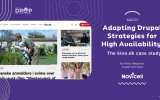Web Sustainability Guidelines 1.0: Promoting Eco-Friendly Digital Practices
World Wide Web Consortium (W3C) introduced Web Sustainability Guidelines (WSG) 1.0 to promote environmentally friendly digital products and services. These guidelines aim to prioritize people and the planet by addressing the environmental impact of web development and design. The digital industry currently contributes 2-5% of global emissions, surpassing even the aviation sector.
The WSG 1.0, as detailed by Andy Blum in his latest article, offers practical recommendations, including reducing data transfer, opting for green hosting, and other strategies to mitigate the environmental footprint of web projects. These guidelines are categorized into different work specialities, making it easier for organizations to tackle sustainability efforts independently in various areas, such as user experience design, web development, infrastructure, and product and business aspects. The guidelines also provide impact and effort ratings to facilitate implementation and measure sustainability benefits.
Additionally, the guidelines emphasize that conformance is measured based on implementing each policy across the entire website or product, allowing for a progressive and adaptable approach to sustainability. While the guidelines offer valuable insights, some stakeholders have suggested the inclusion of quantitative data or case studies to understand each guideline's potential impact better. Overall, these guidelines represent a significant step forward in addressing the environmental impact of web development and design.
Access more information here.
Note: The vision of this web portal is to help promote news and stories around the Drupal community and promote and celebrate the people and organizations in the community. We strive to create and distribute our content based on these content policy. If you see any omission/variation on this please let us know in the comments below and we will try to address the issue as best we can.

























